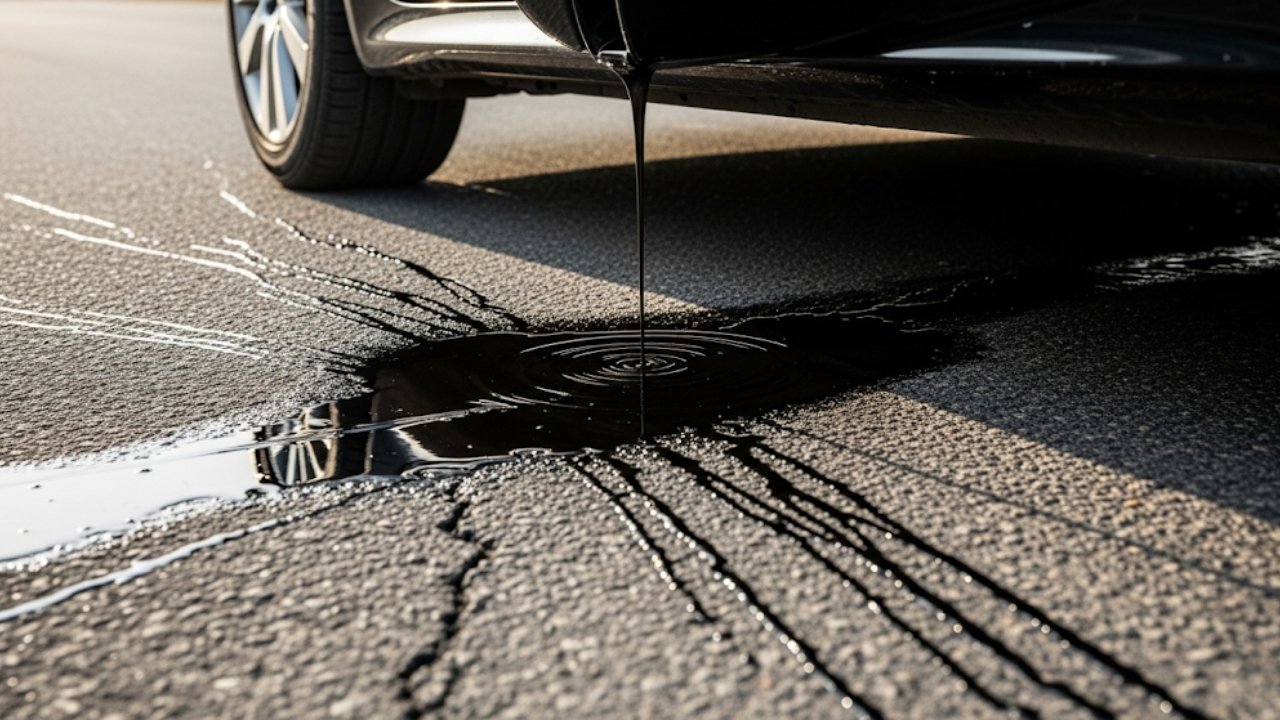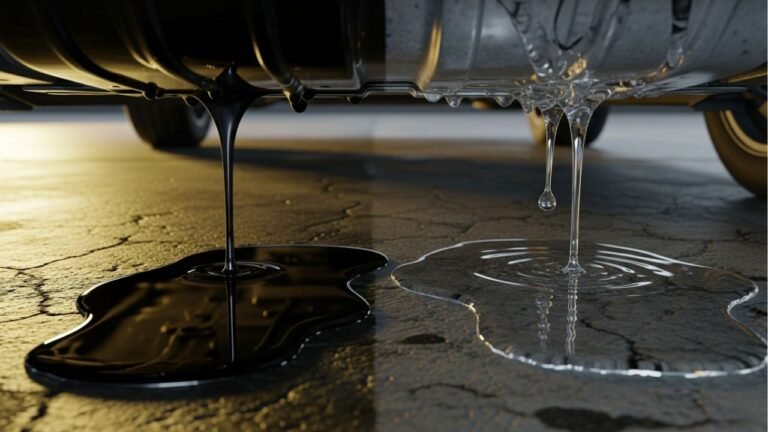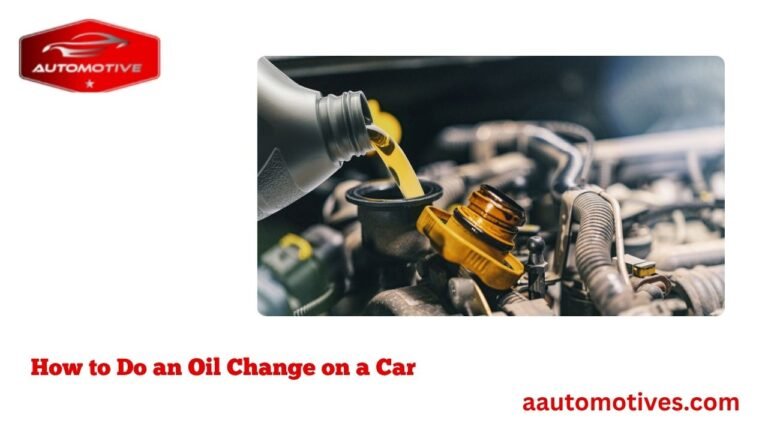Oil Leaked Out of Car? Here’s What You Need to Know

You’ve just come back from a quick run to the store. You park your car, hop out, and notice a dark, slick puddle growing under the engine. Your heart skips a beat. You touch it—it’s oil. You’re probably thinking: “Why has oil leaked out of my car?” You’re not alone.
This moment can feel like a nightmare, especially if you rely on your car daily. Whether you’re dealing with a few drips or a full-blown leak, it’s a serious issue. Ignoring it can lead to engine damage, expensive repairs, or worse—being stranded in the middle of nowhere.
In this guide, we’ll dive deep into:
What causes an oil leak.
What to do when you discover oil leaked out of your car.
How to prevent future leaks.
When it’s safe to drive—and when it’s not.
How to fix it, with or without a mechanic.
Let’s break this down in a simple, friendly, and clear way—like you’re talking with a friend over coffee. We’ll keep the tone light but informative, and always with your safety and wallet in mind.
Why Oil Leaked Out of Car: Common Causes Behind the Mess

1. Worn-Out or Damaged Gaskets and Seals
Your engine has a series of gaskets—tiny rubber or metal pieces that seal joints and prevent leaks. Over time, they crack or harden due to heat and age. The valve cover gasket and oil pan gasket are often the first culprits.
2. Loose or Missing Oil Cap
This might sound silly, but it happens more often than you’d think. Forgetting to tighten your oil cap after a refill can cause oil to spill and leak all over the engine bay. It’s messy and dangerous.
3. Oil Filter Not Seated Properly
If your oil filter is loose or the rubber gasket isn’t in place correctly, oil can leak from around the base. Mechanics sometimes forget to remove the old gasket, leading to a bad seal.
4. Cracked Oil Pan
Driving over rocks or hitting a curb can crack your oil pan, especially if you drive a lower car. This is one of the more serious (and expensive) causes.
5. Worn Engine Parts or Excessive Pressure
Old engines may have worn piston rings or pressure build-up that forces oil out. If you haven’t changed your oil in a while, sludge can build up and create pressure—leading to leaks.
What to Do If Oil Leaked Out of Car Suddenly
This is your act-fast section. When you see that oily puddle, here’s how you can stay calm and handle it like a pro.
Step 1: Confirm It’s Actually Engine Oil
Touch the fluid—engine oil feels slick and smells like petroleum. It’s usually amber, brown, or black. If it’s reddish, it’s transmission fluid. If it’s green or orange, it’s coolant.
Step 2: Check the Oil Level
Use your dipstick. If the oil level is below the minimum mark—or not even showing up—you should not drive. Low oil levels can ruin your engine within minutes.
Step 3: Look Under the Car
Use a flashlight. Is the leak coming from the oil pan? Is the filter wet? Can you spot the drip point? Even a simple inspection can give you clues.
Step 4: Clean the Area and Monitor
If you suspect a minor leak, wipe the engine area clean, run the car for a few minutes, and check again. This helps trace where the leak is coming from.
Driving With Oil Leaked Out of Car: Safe or Risky?
This is one of the most common and dangerous questions people ask. Can I still drive if oil leaked out of my car?
Quick Answer: No, not unless you’re absolutely sure it’s a minor leak.
Driving without oil is like running a marathon with no water. Your engine needs lubrication to reduce friction. Without oil:
Parts grind against each other.
Heat builds up fast.
The engine can seize permanently.
Here’s a simple risk level table for clarity:
| Oil Leak Severity | Visible Signs | Safe to Drive? |
|---|---|---|
| Minor (few drops) | Small spot under the car, no drop in oil level | Yes, short distances |
| Moderate (leaves a puddle) | Wet underside, oil light flickers | Only to mechanic |
| Major (pooling fast) | Dipstick empty, engine noise or warning light | No, tow it immediately |
The Cost of Ignoring That Oil Leak
Ignoring an oil leak is like ignoring a toothache. It seems small until it becomes a root canal—or in this case, a blown engine.
Let’s look at some real consequences of letting it go:
Burning oil smell inside the cabin.
Overheating engine and warped components.
Environmental damage—leaked oil can poison soil and water.
Fire hazard if oil touches hot parts like the exhaust manifold.
Complete engine failure, which can cost $3,000–$7,000 to fix.
In short, that little puddle could cost you a vacation.
How to Fix an Oil Leak (And When You Need a Mechanic)
Fixing an oil leak depends on its cause. If it’s something simple like a loose filter, you can handle it in your driveway. But more serious issues need pro help.
DIY Fixes You Can Try:
Tighten oil cap and filter.
Replace oil cap if cracked.
Use oil stop leak additive for tiny leaks (temporary fix).
Check and tighten drain plug under the oil pan.
⚠️ Caution: Don’t use stop leak products on modern engines too often—they can gum up sensors and seals.
Call a Mechanic If:
You spot cracks or holes in the oil pan.
The leak is from gaskets or seals that require opening the engine.
There’s white smoke or burning oil smell from the engine bay.
Real Story: “My Oil Leaked Out on the Highway—Here’s What Happened”
Let me take you back to a Friday afternoon. I was driving down I-85, heading home for the weekend. Everything was fine until I noticed a light flickering on the dashboard—the oil pressure warning light. I brushed it off at first, thinking maybe the sensor was just acting up.
But within minutes, I felt the engine getting hotter. I pulled over, opened the hood, and noticed smoke coming from the engine bay. A closer look under the car showed a dark puddle—oil had leaked out of the car.
It turned out the oil filter had come loose and drained the system on the road. I had the car towed, and the repair cost me over $400. That moment taught me a tough lesson: never ignore small signs. Your car tries to talk to you. Don’t wait until it’s screaming.
FAQs About Oil Leaked Out of Car
Here are some of the most common questions people ask when they discover an oil leak. If you’re panicking, take a breath—these answers will help.
1. What happens if all the oil leaks out of your car?
If all the oil leaks out, your engine will lose lubrication. This causes metal parts to grind together, overheat, and eventually seize. In the worst-case scenario, your engine could fail completely, requiring a rebuild or full replacement.
2. Is it OK to drive a car with an oil leak?
It depends on the severity. A tiny leak with no drop in oil level might be manageable short-term. But a large or active leak is a red flag. You risk engine damage, fire hazards, or even accidents if oil gets on your tires.
3. How long can I drive with an oil leak?
If it’s a small leak, maybe a day or two—max. If oil is leaking fast, do not drive at all. Tow the car to a shop. It’s not worth gambling your engine over.
4. What does an oil leak look like?
Oil leaks leave dark brown or black puddles under the engine. You might also see wet or greasy parts in the engine bay. Sometimes, you’ll smell burning oil when it drips onto hot metal.
5. Can an oil leak cause my engine to catch fire?
Yes, it’s rare but possible. If oil drips onto hot parts like the exhaust manifold, it can ignite. That’s why it’s important to fix leaks early—not just for your engine, but for your safety.
6. How much does it cost to fix an oil leak?
It ranges from $20 to $1,000+, depending on the problem. Replacing a loose oil cap is cheap. But fixing a gasket deep inside the engine? That can be expensive because of labor.
7. Will an oil leak fail a car inspection?
In many states, yes. Oil leaks are often flagged during safety inspections. Leaks can affect braking, emissions, and other critical systems—so you’ll likely need to fix it before passing.
8. Can I fix an oil leak myself?
If it’s a simple leak like a loose filter or cap, yes. But for anything involving gaskets, the oil pan, or engine internals, it’s best to call a mechanic. Modern engines are complex and delicate.
Signs You Have an Oil Leak (Even If You Don’t See a Puddle)
Not all oil leaks leave dramatic puddles. Some leaks are slow, hidden, or only happen while driving. Look out for these signs:
Burning oil smell inside or around your car.
Oil pressure light flickering or staying on.
Ticking or knocking sounds from the engine.
Excessive exhaust smoke, especially blue or grey.
️ Low oil levels without any explanation.
Don’t ignore these clues. If you check your dipstick and oil is always low—even when you don’t see a leak—then it’s going somewhere. Catch the problem early, and you might avoid costly repairs.
Oil Leak Vs. Oil Consumption: What’s the Difference?
Sometimes people confuse oil leaks with oil consumption. Here’s a quick breakdown:
| Oil Leak | Oil Consumption |
|---|---|
| Oil escapes outside the engine | Oil burns inside the engine |
| Leaves puddles or drips on the ground | No visible leak—just lower oil levels |
| Caused by bad seals, gaskets, or cracks | Caused by worn piston rings or valve seals |
| Can be seen or smelled under the car | Shows in exhaust smoke or engine wear |
If your car uses oil but doesn’t leave a puddle, you might need an internal engine diagnosis. But either way—you’re losing oil, and that’s not okay.
Oil Leak Myths You Shouldn’t Believe
Let’s clear up some common myths that lead people to make costly mistakes.
❌ “A small leak is nothing to worry about.”
Wrong. Small leaks can grow fast. They also attract dirt, ruin engine mounts, and damage belts.
❌ “Just add more oil and keep driving.”
This might get you by for a day or two, but it’s not a fix. You’ll just end up with a huge repair bill later.
❌ “Modern engines don’t leak oil.”
Actually, many do—especially turbocharged or high-mileage engines. Age, heat, and wear affect all engines eventually.
How Mechanics Diagnose Oil Leaks
If you take your car in for an oil leak, here’s what the mechanic might do:
Use a UV dye test—a special dye is added to the oil, and a UV light helps trace the leak source.
Do a pressure test on the crankcase.
Check underbody shields for soaked areas.
Inspect gaskets, seals, and the oil filter.
Sometimes, the entire engine bay is washed to remove grime before re-checking for leaks.
This process helps pinpoint leaks quickly and accurately.
Final Thoughts: Don’t Let a Leak Destroy Your Ride
An oil leak might seem small, but it’s one of those issues that snowballs quickly. I’ve been there—thinking, “It’s just a few drops, no big deal.” A week later, I was calling a tow truck.
The truth is: Your car talks to you. Every drip, smell, or warning light is a whisper asking for help. Listen early, and you save money, time, and headaches. Ignore it, and you might end up shopping for a new engine.
So next time you see oil leaked out of car, don’t panic—but don’t wait either. Grab a flashlight, pop the hood, and start asking the right questions.
You’ve got this.






